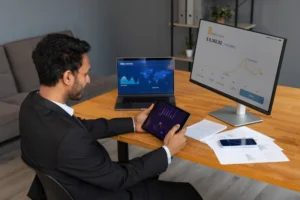How to Grow a Small Account on Quotex for Beginners
Starting with a small trading account on Quotex might feel limiting, but with the right mindset and strategy, you can turn a modest balance into consistent growth over time. Many beginners think they need a large deposit to succeed, but in reality, disciplined trading and smart risk management are far more important than a big balance.
In this article, you’ll learn practical, beginner-friendly tips to help grow a small Quotex account safely and sustainably.
-
Start with the Right Expectations
First and foremost, understand that growing a small account takes time. You won’t become rich overnight. The goal is steady growth, not instant profits.
Set realistic targets like:
- 3% to 5% account growth per week
- Avoiding large losses
- Learning from every trade
This mindset will protect you from emotional decisions and help build a strong trading foundation.
-
Use the Demo Account to Master Your Skills
Before risking any real money, spend time on the demo account. Treat it like real trading by:
- Using realistic trade sizes
- Practicing discipline and strategy
- Tracking performance like it’s your real account
Once you consistently perform well on demo, move to your small live account with confidence.
-
Keep Your Trade Size Small
One of the biggest mistakes beginners make is risking too much on each trade. Even with a small balance, never risk more than 1–2% per trade.
For example:
- On a $20 account, risk $0.20 to $0.40 per trade.
- If you lose, the damage is small.
- If you win, your growth is steady and safe.
This allows you to take more trades and survive losing streaks without blowing your account.
-
Focus on High-Probability Setups
Don’t trade just because you feel like it. Only take trades when your setup is clear and meets your strategy conditions.
Simple strategies for beginners include:
- Trend following: Trade in the direction of the overall price movement.
- Support and resistance: Look for price to bounce or reverse near previous highs or lows.
- Candlestick patterns: Recognize reversal or continuation signals from basic candle shapes.
Be picky. One good trade is better than five bad ones.
-
Trade at Consistent Times
The market behaves differently at different times of the day. Pick a time slot (like 30–60 minutes daily) and trade only during that window.
This helps you:
- Stay focused
- Avoid random decisions
- Learn how the market behaves in that session
Consistency in your routine leads to consistency in your results.
-
Stick to One Asset Pair
It might be tempting to jump from EUR/USD to Bitcoin to Gold, but it’s better to focus on one asset in the beginning. Learn how that market moves, reacts, and behaves.
Specializing will improve your confidence and increase your accuracy over time.
-
Track Every Trade in a Journal
A simple spreadsheet or notebook can help you monitor:
- Trade time
- Asset traded
- Direction (up/down)
- Reason for entry
- Win or loss
- Lessons learned
Review your journal weekly. Look for patterns in your behavior—what works, what doesn’t—and use those insights to refine your approach.
-
Control Your Emotions
Your emotions can be your worst enemy when growing a small account. If you lose a trade, don’t double the next one to “win it back.” If you win, don’t get greedy and increase the risk too soon.
Stick to your plan. Take breaks when needed. Log out if you feel anxious, excited, or angry. Emotional trading leads to blown accounts—especially small ones.
-
Don’t Withdraw Too Early
When your small account starts growing, you might want to withdraw immediately. While it’s important to enjoy your gains, consider reinvesting some of your profits to increase your trading capital.
For example:
- If you grow your account from $20 to $50, withdraw $10, and keep $40 to trade with.
- This builds both confidence and capital.
Balance reward and reinvestment wisely.
-
Be Patient and Think Long-Term
Success doesn’t come from one lucky trade—it comes from months of consistency, learning, and discipline. Trading is a skill that improves over time.
Stay focused on:
- Avoiding big losses
- Improving one step at a time
- Celebrating small wins
If you stay consistent and patient, a small account can grow far beyond what you imagined.
Final Thoughts
You don’t need a large deposit to succeed on Quotex. All you need is the right attitude, a solid plan, and the discipline to stick with it.
By managing your risk, trading strategically, and controlling your emotions, your small account can become the foundation for long-term trading success.
Remember, it’s not about how much you start with—it’s about how well you manage it.

Deepak Sharma
Namaste! I’m Deepak Sharma, the creative mind behind SocialFunda, your go-to hub for Facebook bios, captivating captions, Instagram bios, and a treasure trove of Hindi Shayari. As a digital enthusiast, I am passionate about curating content that adds a touch of flair to your online presence.







